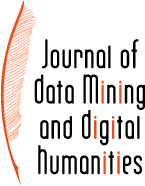 |
Politique éditoriale
Sommaire
- Processus d'évaluation par les pairs
- Frais
- Périodicité
- Communications - Rapports
- Libre-accès et licences gratuites
- Matériel original
- Jeux de données
- Éthique éditoriale
- Langue
- Autorat
- Comité de rédaction
Processus d'évaluation par les pairs
La première étape de la soumission pour les auteurs est de créer un compte et de valider sa soumission en utilisant l'identifiant reçu lors du dépôt de preprint dans une Archive ouverte autorisée.
*Une fois la soumission effective, dans les 5 jours, un rédacteur en chef décide de prendre en charge la soumission.
*Le rédacteur en chef dispose de 7 jours pour choisir au moins deux éditeurs-réviseurs. Les éditeurs-réviseurs choisis restent anonymes pour l'auteur(s).
*Les éditeurs-réviseurs examinent l'article et renvoient leurs commentaires sur le site web de JDMDH en moins de 30 jours après avoir accepté l'examen. Si l'éditeur-réviseur donne l'examen à un collègue, le nom du réviseur adjoint apparaîtra comme contributeur pour l'année en cours. Dans tous les cas, tous les noms des réviseurs apparaissent sur le site web de JDMDH.
*Si l'article est accepté, les auteurs auront 30 jours pour apporter leurs corrections. Le cycle peut être renouvelé, et lorsque tous les réviseurs sont d'accord avec les corrections finales, l'article est accepté par le rédacteur en chef et apparaît immédiatement dans la rubrique "derniers articles" du site web de JDMDH.
Frais
JDMDH est une revue à comité de lecture en libre accès. Les institutions françaises INRAE, INRIA et CNRS financent la plateforme Episciences en open access construite sur un modèle sans frais pour l’auteur (voie verte). Pas de frais pour les auteurs ni pour les lecteurs.
Périodicité
JDMDH est une revue trimestrielle en accès libre.
Communications - Rapports
Les auteurs ayant conçu des outils logiciels utiles, des jeux de données librement accessibles, des concours ou de grands projets de recherche peuvent également soumettre directement un article court avec sa description et sa mise en œuvre. Les articles courts suivent les mêmes directives que les articles longs pour le manuscrit. Les rapports sont également évalués par des pairs.
Libre-accès et licences gratuites
JDMDH est une revue à comité de lecture en libre accès. La revue s'appuie sur un modèle sans frais pour l’auteur (voie verte). Tout le contenu est disponible gratuitement pour les utilisateurs ou leurs institutions. Les utilisateurs sont autorisés à lire, télécharger, copier, distribuer, imprimer, rechercher ou créer des liens vers le texte intégral des articles de cette revue sans demander l'autorisation préalable de l'éditeur ou des auteurs, conformément à la définition de l'accès ouvert du BOAI. Les articles sont distribués sous une licence Creative Commons CC-BY : les utilisateurs sont libres de copier, distribuer, transmettre. Les auteurs accordent à la revue des droits de publication non exclusifs et conservent leurs propres droits sans restriction.

Les articles du JDMDH sont placés sous une licence Creative Commons Attribution 4.0 International License Creative Commons Attribution 4.0 International License.
Matériel original
Le JDMDH publie des études originales et non publiées ailleurs. Tout texte soumis à JDMDH doit être exclusif. En tout état de cause, les textes déjà publiés dans une version courte lors d'un atelier, par exemple, peuvent être publiés dans une version étendue dans le journal.
Voir https://jdmdh.episciences.org/page/submissions# pour consulter les consignes à l'intention des auteurs.
Jeux de données
Le succès de l'analyse et du traitement des données dépend de la qualité des données qu'ils traitent et des informations fiables sur la manière dont ces données ont été obtenues. L'accès aux jeux de données doit être mentionné, ainsi que la manière dont ils peuvent être utilisés et toutes les informations supplémentaires qui peuvent aider les chercheurs à les utiliser correctement.
Éthique éditoriale
L'origine et la paternité de tout matériel réutilisé dans un article du JDMDH doivent être mentionnées. Les auteurs de JDMDH ne doivent pas copier une partie substantielle du travail d'un autre auteur sans le mentionner, ni présenter le travail d'un autre auteur comme étant le leur. Cette politique s'applique à tous les documents publiés, y compris le texte du manuscrit et les figures, les logiciels et les ensembles de données. JDMDH attend des auteurs qu'ils soient honnêtes : ils ne doivent pas fabriquer ou manipuler des données pour étayer leurs affirmations, sélectionner des illustrations favorables ou dissimuler des problèmes connus liés à leur travail. Les éventuels conflits d'intérêts doivent être signalés au rédacteur en chef. Le non-respect de ces règles peut entraîner la rétractation d'un article publié.
JDMDH adhère aux principes de transparence et aux bonnes pratiques recommandées par le Comité d'éthique de la publication (COPE, http://publicationethics.org/).
Langue
La langue de soumission est l'anglais.
Autorat
S'il y a plusieurs auteurs, l'un d'entre eux sera l'auteur correspondant avec JDMDH. Vous devez compléter votre profil avec des identifiants. L'identifiant Orcid (orcid.org) (orcid.org) n'est pas obligatoire mais fortement souhaité.
Comité de rédaction
Le comité de rédaction se compose de trois parties : Les rédacteurs en chef choisissent les articles pertinents à transmettre aux rédacteurs-réviseurs et valident leur acceptation, les conseillers-réviseurs valident les décisions importantes pour l'avenir de la revue et un groupe de rédacteurs-réviseurs vérifient la pertinence des articles soumis au JDMDH.
See http://jdmdh.episciences.org/page/editorial-team
Le comité éditorial évolue. Certains membres peuvent quitter le comité et d'autres peuvent le rejoindre pour le rendre opérationnel à long terme.